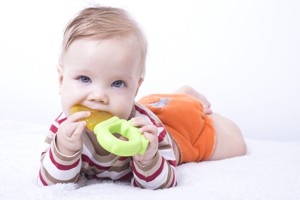 Sleepless nights, tears, and loose stools; they all tend to come hand-in-hand with teething. As your baby’s teeth work their way through the gums, your baby is likely to experience a lot of pain and discomfort, and as their parent, it can be heart-breaking for you to watch your little one suffer, especially when cuddling alone doesn’t seem to help. There are lots of tried and tested remedies that can help your baby, but as every child is different, not every solution will work for your child. It might take a few days of testing to find something that gives your child the relief they need.
Sleepless nights, tears, and loose stools; they all tend to come hand-in-hand with teething. As your baby’s teeth work their way through the gums, your baby is likely to experience a lot of pain and discomfort, and as their parent, it can be heart-breaking for you to watch your little one suffer, especially when cuddling alone doesn’t seem to help. There are lots of tried and tested remedies that can help your baby, but as every child is different, not every solution will work for your child. It might take a few days of testing to find something that gives your child the relief they need.
Teething can cause a range of symptoms, and you can learn more about that from our article Teething Symptoms and Signs of Teething. Therefore, we have put together a list of remedies that address a range of symptoms. Not all of the remedies will combat all of the symptoms, so you may need to find a combination that works for your baby.
Pain Relief
As you may have experienced yourself, toothache is very painful, and it’s no different for babies when cutting their teeth. There are a number of solutions you can try to help relieve that pain.
Teething Powders / Granules
Teething Powders and Granules come in small sachets that you tip into your baby’s mouth. Manufacturers claim that they have “natural” or “homeopathic” pain relieving ingredients, although there is little evidence to support these claims. Almost all of them have some form of sugar as their primary ingredient, often in the form of lactose, which is a sugar derived from milk. It’s thought that sugar has the ability to relieve pain in very young children, which may be why many parents find teething powders and granules to be very effective. Another theory behind their effectiveness is that the act of tipping the powder in the child’s mouth provides a temporary distraction from the pain. However they work, it is clear from their popularity amongst parents that they do seem to have some effect.
If you are concerned about giving your child sugar, then check the ingredients listed on the packet before buying teething powders and granules. The packaging may claim to be sugar-free, but this usually refers to refined sugar and you may find that the product still contains sugar derived from other sources, such as lactose from milk and fructose from fruit.
Chewing Cold Objects
 Your baby may find comfort from chewing on something cold, such as a teething ring that has been placed in the fridge, a cold and clean damp flannel, or a frozen ice lolly if they are older. That is because cold can reduce swelling, which is why ice packs are used for injuries such as sprains, and much of the pain from teething is a result of inflammation of the baby’s gums. Never put a teething ring in the freezer.
Your baby may find comfort from chewing on something cold, such as a teething ring that has been placed in the fridge, a cold and clean damp flannel, or a frozen ice lolly if they are older. That is because cold can reduce swelling, which is why ice packs are used for injuries such as sprains, and much of the pain from teething is a result of inflammation of the baby’s gums. Never put a teething ring in the freezer.
Your baby may also just want to chew on something to help relieve the pressure that he can feel in his mouth. There are plenty of teething rings and toys available to choose from, and it’s worth investing in a few different types as they can also act as a distraction for your baby. If your baby is older and has been weaned, you could give him some raw carrot to chew on, but never leave a young child unattended when they have food in case of choking.
Teething Gels
You can buy special pain relieving teething gels from your pharmacist. These contain a mild anaesthetic and are sugar-free. They are only available for babies over the age of four-months. As there are a number of products on the market, check with your pharmacist before buying that your chosen product is suitable for young children, as not all are.
The gel is rubbed directly onto the child’s gums, and acts quickly. Of course, it can be a bit of a battle getting the gel into your child’s mouth in the first place, especially if she already has some teeth, so watch those fingers!
Infant Paracetamol & Ibuprofen
Some children do not respond at all to any alternative pain relieving solutions, and sometimes the only thing that works is infant paracetamol or infant ibuprofen. Always check the dosage before giving your child any medicine and follow the dosage instructions carefully. These medicines have the additional effect of lowering your child’s temperature, which can be raised during teething.
Relief From Teething Fever
 Whilst many health professionals refute any links, parents frequently report that their children had a slightly elevated temperature during teething. If your child has a slight fever this may make her more irritable and possibly interfere with sleep. Keep your child cool by removing layers, but make sure that she subsequently doesn’t get too cold. Offer plenty of cool fluids. You can also give your child infant paracetamol to lower her temperature, but this may not be necessary if she is not showing any other signs of discomfort.
Whilst many health professionals refute any links, parents frequently report that their children had a slightly elevated temperature during teething. If your child has a slight fever this may make her more irritable and possibly interfere with sleep. Keep your child cool by removing layers, but make sure that she subsequently doesn’t get too cold. Offer plenty of cool fluids. You can also give your child infant paracetamol to lower her temperature, but this may not be necessary if she is not showing any other signs of discomfort.
Check your child’s temperature periodically and if it seems particularly high and your child has other symptoms of illness then she may be suffering from a virus or infection. Always consult a medical professional if you are concerned about any symptoms.
Relief From Teething Diarrhoea / Loose Stools & Nappy Rash
Your child may experience loose stools or diarrhoea-like symptoms during teething, thought to be as a result of the increased saliva generated that upsets the digestive system. If your baby has not been weaned, then keep offering plenty of fluids and monitor them for any signs of dehydration.
If you baby has been weaned, then you can give him foods from what is commonly referred to as the BRAT diet. These are bananas, rice, apple puree, and toast. These foods are more gentle on the digestive system and bind in the stomach, producing more solid stools. Because there is more acid in looser stools, your baby may also develop nappy rash. There are a number of creams available to help with this.
Avoid using wet wipes on your baby’s bottom when they have nappy rash, instead use cotton wool and cool water. Your baby may also find baths uncomfortable as the warm water can aggravate the sore area. In addition, give your baby plenty of time out of their nappy, lining the floor with old towels if necessary, as this is often the best way to clear up nappy rash.
